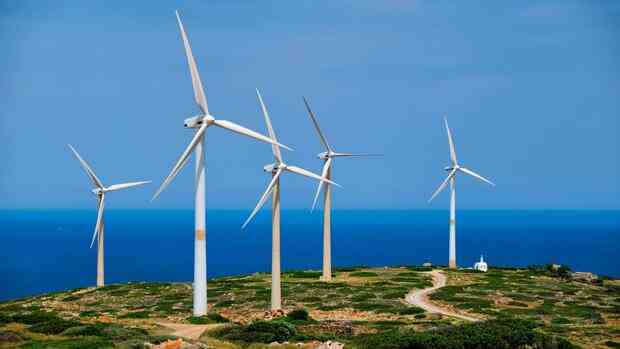Greece has significantly increased its own expansion targets for power generation from renewables.
(Photo: IMAGO/imagebroker)
Athens October 7, 2022 was a historic date for Greece, even if most people didn’t notice it: on that sunny and windy autumn day, the country covered its electricity consumption entirely with green electricity for five hours. This shows the potential of renewable energy sources in Greece and the progress the country is making in using them.
At the same time, Greece is drastically reducing its gas imports from Russia. While the state-owned Gazprom company still covered 40.4 percent of Greek natural gas requirements in the first eleven months of 2021, the country only got 14.4 percent of its gas imports from Russia between January and November.
In November 2022, gas imports from Russia were even 98.3 percent lower than in the previous year. Greece has thus freed itself from dependence on gas supplier Russia within a year.
This was made possible, among other things, by drastic savings in gas consumption. In the months of August to November it fell by 33 percent compared to the previous year. Greece has thus far exceeded the savings targets of the European Union.
Top jobs of the day
Find the best jobs now and
be notified by email.
Last summer, the EU countries agreed to reduce their gas consumption between August 1, 2022 and March 1, 2023 by 15 percent below the average consumption of the past five years. Already in the first four months of the reference period, Greece saved more than twice as much as specified. Industry made the largest contribution, reducing its gas consumption by 64 percent, followed by the energy industry. It burned 30 percent less natural gas in its power plants than in the previous year.
Greece uses twice as much LNG as a year ago
In order to break away from the supplier Gazprom, the gas network operator Desfa relies primarily on liquefied natural gas (LNG). The throughput of the only Greek LNG terminal on the island of Revithoussa near Athens almost doubled in November 2022 compared to the same month last year, with growth of 93 percent.
>> Read also: Shipowners compete for shipyard capacities for LNG ships – Greeks dominate the market
The most important LNG suppliers are the USA, followed by Algeria, Nigeria and Egypt. Greece also gets natural gas from Azerbaijan via Turkey’s Trans-Anatolian Pipeline.
Greece has an LNG terminal that is mainly supplied from the USA.
(Photo: imago images/ANE Edition)
Most of the gas in Greece goes to power generation. Last year, gas-fired power plants contributed almost 40 percent to this. In order to secure the power supply despite the gas savings targets, the conservative government has postponed the phase-out of lignite-fired power generation planned for 2025 to the end of 2028.
At the same time, the government wants to push the use of renewable energy sources. In its National Energy and Climate Plan presented in 2019, it set the share of renewables in the electricity mix at 61 percent for 2030. According to Energy Minister Kostas Skrekas, the target is now 80 percent. To do this, green electricity projects with an installed capacity of more than 20 gigawatts (GW) must be connected to the grid over the next eight years and storage capacities of seven to eight GW must be built up.
Economics Minister Adonis Georgiadis estimates that investments of 50 billion euros will be necessary. The necessary network expansion is likely to cost another ten billion euros.
Renewables account for almost half of the electricity supply
Greece is already making good progress on the way to the 80 percent target: In the first ten months of 2022, the share of renewables in the electricity mix reached 47.1 percent, according to the Greek grid operator Admie. For comparison: ten years ago it was just six percent.
The Greek green electricity boom is also attracting foreign energy companies. In January, Greek Public Power Corporation (PPC) and Germany’s RWE Renewables formed a joint venture, Meton Energy AG. RWE controls the joint venture with 51 percent of the shares. PPC contributes nine solar projects with a capacity of 940 megawatts (MW).
The photovoltaic systems are located in former open-pit lignite mines in North Greek Macedonia. Together, RWE and PPC want to implement renewable energy projects with a capacity of at least two gigawatts (GW) in Greece. Katja Wunschel, CEO Onshore Wind and Solar Europe & Australia at RWE Renewables, sees great potential: “For us, Greece is a promising growth market with high potential for solar energy and a clear commitment to renewable energies.”
More: Greece and Egypt are planning power cables across the Mediterranean
